To Undertake One's Commitment Without Hope, Yet With Unwavering Action
VerifiedAdded on 2019/09/22
|9
|4679
|307
Essay
AI Summary
The existentialist philosophy, as presented by Jean-Paul Sartre, emphasizes that human beings are responsible for their own actions and decisions, which shape who they become. It rejects the idea of quietism, where one waits for others to take action, instead advocating for individual commitment and responsibility. The philosophy also argues that there is no inherent worth or potentiality in individuals beyond what they have actualized through their actions. According to Sartre, a person's existence is defined by their choices and commitments, and they have the power to change themselves at any moment.
Contribute Materials
Your contribution can guide someone’s learning journey. Share your
documents today.
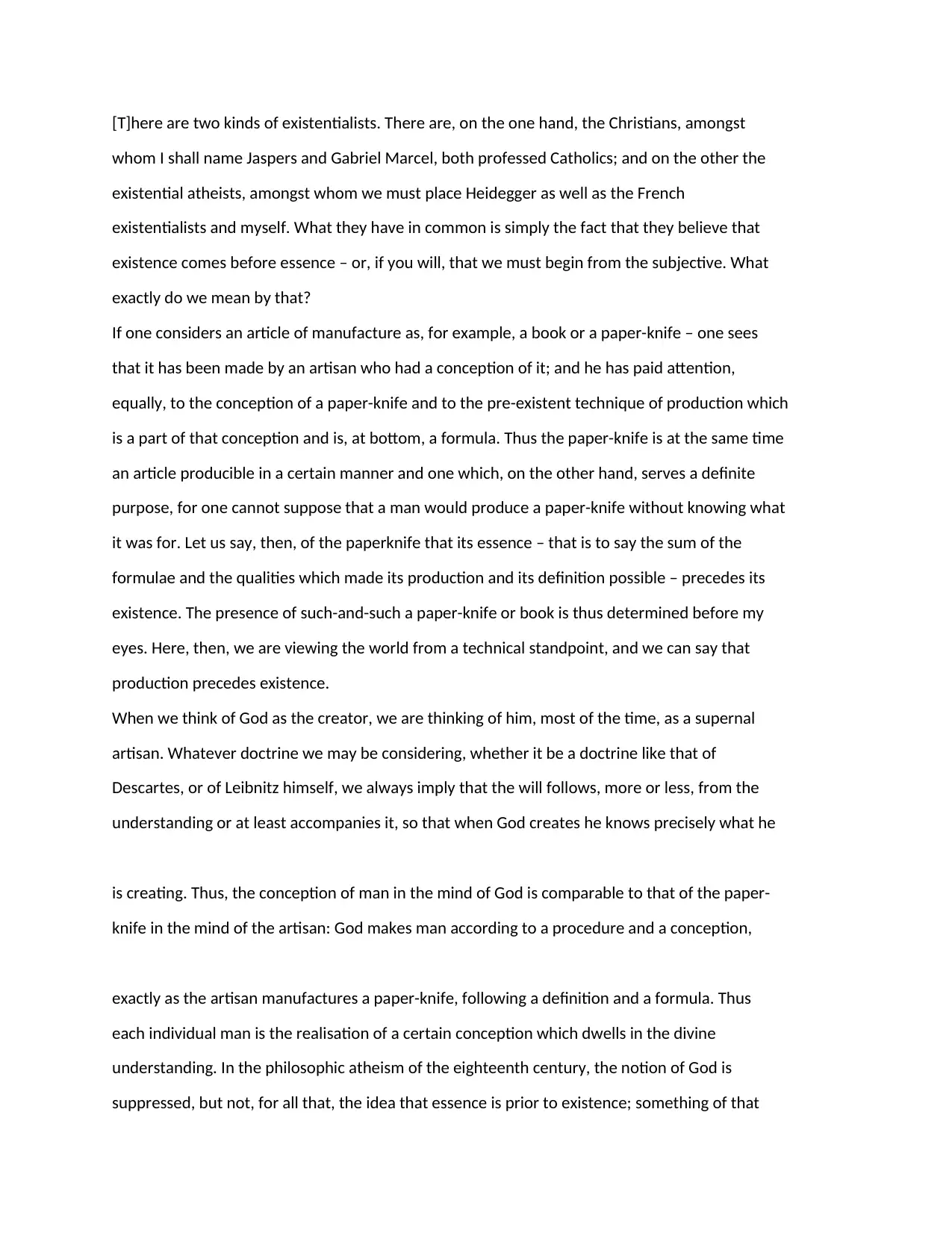
[T]here are two kinds of existentialists. There are, on the one hand, the Christians, amongst
whom I shall name Jaspers and Gabriel Marcel, both professed Catholics; and on the other the
existential atheists, amongst whom we must place Heidegger as well as the French
existentialists and myself. What they have in common is simply the fact that they believe that
existence comes before essence – or, if you will, that we must begin from the subjective. What
exactly do we mean by that?
If one considers an article of manufacture as, for example, a book or a paper-knife – one sees
that it has been made by an artisan who had a conception of it; and he has paid attention,
equally, to the conception of a paper-knife and to the pre-existent technique of production which
is a part of that conception and is, at bottom, a formula. Thus the paper-knife is at the same time
an article producible in a certain manner and one which, on the other hand, serves a definite
purpose, for one cannot suppose that a man would produce a paper-knife without knowing what
it was for. Let us say, then, of the paperknife that its essence – that is to say the sum of the
formulae and the qualities which made its production and its definition possible – precedes its
existence. The presence of such-and-such a paper-knife or book is thus determined before my
eyes. Here, then, we are viewing the world from a technical standpoint, and we can say that
production precedes existence.
When we think of God as the creator, we are thinking of him, most of the time, as a supernal
artisan. Whatever doctrine we may be considering, whether it be a doctrine like that of
Descartes, or of Leibnitz himself, we always imply that the will follows, more or less, from the
understanding or at least accompanies it, so that when God creates he knows precisely what he
is creating. Thus, the conception of man in the mind of God is comparable to that of the paper-
knife in the mind of the artisan: God makes man according to a procedure and a conception,
exactly as the artisan manufactures a paper-knife, following a definition and a formula. Thus
each individual man is the realisation of a certain conception which dwells in the divine
understanding. In the philosophic atheism of the eighteenth century, the notion of God is
suppressed, but not, for all that, the idea that essence is prior to existence; something of that
whom I shall name Jaspers and Gabriel Marcel, both professed Catholics; and on the other the
existential atheists, amongst whom we must place Heidegger as well as the French
existentialists and myself. What they have in common is simply the fact that they believe that
existence comes before essence – or, if you will, that we must begin from the subjective. What
exactly do we mean by that?
If one considers an article of manufacture as, for example, a book or a paper-knife – one sees
that it has been made by an artisan who had a conception of it; and he has paid attention,
equally, to the conception of a paper-knife and to the pre-existent technique of production which
is a part of that conception and is, at bottom, a formula. Thus the paper-knife is at the same time
an article producible in a certain manner and one which, on the other hand, serves a definite
purpose, for one cannot suppose that a man would produce a paper-knife without knowing what
it was for. Let us say, then, of the paperknife that its essence – that is to say the sum of the
formulae and the qualities which made its production and its definition possible – precedes its
existence. The presence of such-and-such a paper-knife or book is thus determined before my
eyes. Here, then, we are viewing the world from a technical standpoint, and we can say that
production precedes existence.
When we think of God as the creator, we are thinking of him, most of the time, as a supernal
artisan. Whatever doctrine we may be considering, whether it be a doctrine like that of
Descartes, or of Leibnitz himself, we always imply that the will follows, more or less, from the
understanding or at least accompanies it, so that when God creates he knows precisely what he
is creating. Thus, the conception of man in the mind of God is comparable to that of the paper-
knife in the mind of the artisan: God makes man according to a procedure and a conception,
exactly as the artisan manufactures a paper-knife, following a definition and a formula. Thus
each individual man is the realisation of a certain conception which dwells in the divine
understanding. In the philosophic atheism of the eighteenth century, the notion of God is
suppressed, but not, for all that, the idea that essence is prior to existence; something of that
Secure Best Marks with AI Grader
Need help grading? Try our AI Grader for instant feedback on your assignments.
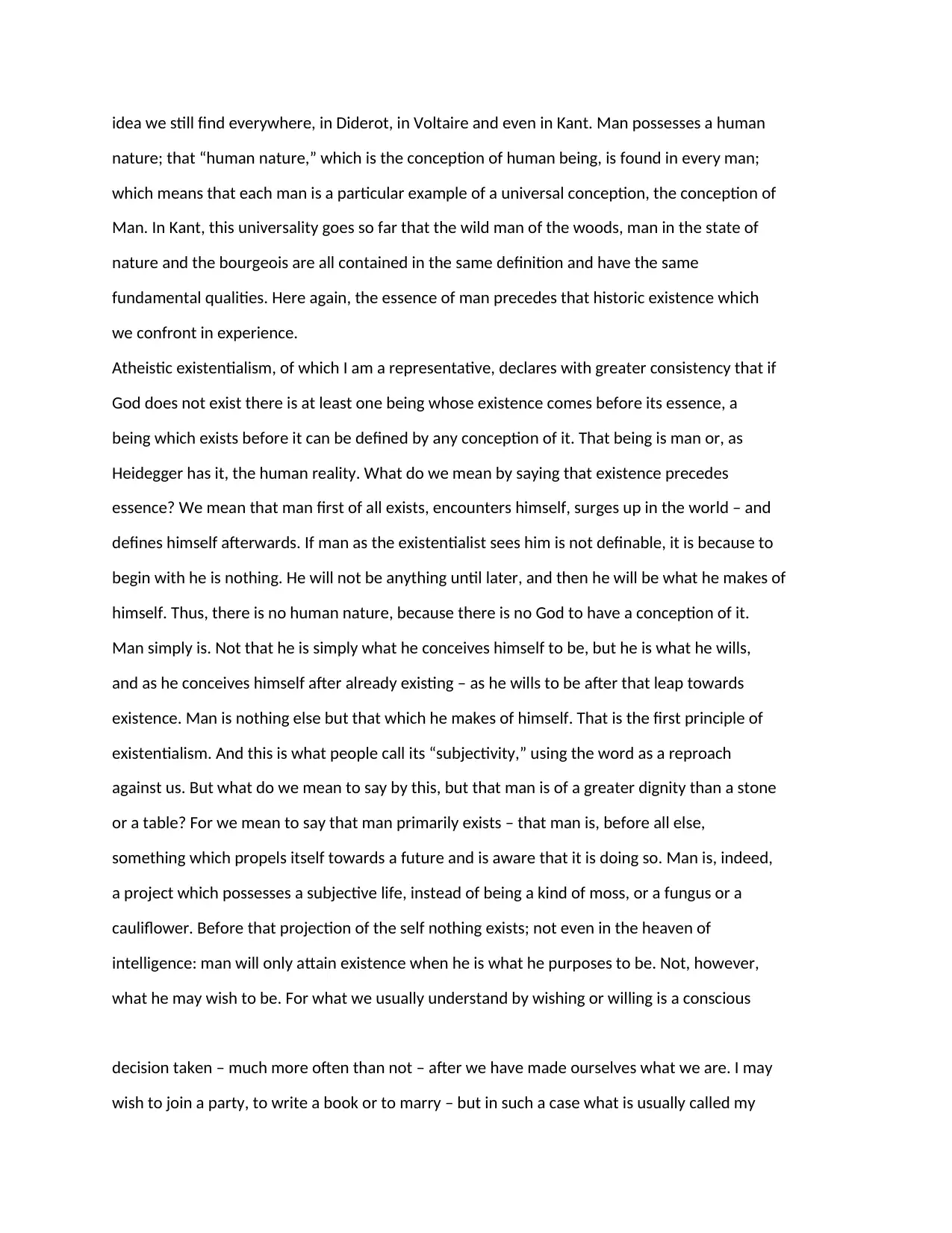
idea we still find everywhere, in Diderot, in Voltaire and even in Kant. Man possesses a human
nature; that “human nature,” which is the conception of human being, is found in every man;
which means that each man is a particular example of a universal conception, the conception of
Man. In Kant, this universality goes so far that the wild man of the woods, man in the state of
nature and the bourgeois are all contained in the same definition and have the same
fundamental qualities. Here again, the essence of man precedes that historic existence which
we confront in experience.
Atheistic existentialism, of which I am a representative, declares with greater consistency that if
God does not exist there is at least one being whose existence comes before its essence, a
being which exists before it can be defined by any conception of it. That being is man or, as
Heidegger has it, the human reality. What do we mean by saying that existence precedes
essence? We mean that man first of all exists, encounters himself, surges up in the world – and
defines himself afterwards. If man as the existentialist sees him is not definable, it is because to
begin with he is nothing. He will not be anything until later, and then he will be what he makes of
himself. Thus, there is no human nature, because there is no God to have a conception of it.
Man simply is. Not that he is simply what he conceives himself to be, but he is what he wills,
and as he conceives himself after already existing – as he wills to be after that leap towards
existence. Man is nothing else but that which he makes of himself. That is the first principle of
existentialism. And this is what people call its “subjectivity,” using the word as a reproach
against us. But what do we mean to say by this, but that man is of a greater dignity than a stone
or a table? For we mean to say that man primarily exists – that man is, before all else,
something which propels itself towards a future and is aware that it is doing so. Man is, indeed,
a project which possesses a subjective life, instead of being a kind of moss, or a fungus or a
cauliflower. Before that projection of the self nothing exists; not even in the heaven of
intelligence: man will only attain existence when he is what he purposes to be. Not, however,
what he may wish to be. For what we usually understand by wishing or willing is a conscious
decision taken – much more often than not – after we have made ourselves what we are. I may
wish to join a party, to write a book or to marry – but in such a case what is usually called my
nature; that “human nature,” which is the conception of human being, is found in every man;
which means that each man is a particular example of a universal conception, the conception of
Man. In Kant, this universality goes so far that the wild man of the woods, man in the state of
nature and the bourgeois are all contained in the same definition and have the same
fundamental qualities. Here again, the essence of man precedes that historic existence which
we confront in experience.
Atheistic existentialism, of which I am a representative, declares with greater consistency that if
God does not exist there is at least one being whose existence comes before its essence, a
being which exists before it can be defined by any conception of it. That being is man or, as
Heidegger has it, the human reality. What do we mean by saying that existence precedes
essence? We mean that man first of all exists, encounters himself, surges up in the world – and
defines himself afterwards. If man as the existentialist sees him is not definable, it is because to
begin with he is nothing. He will not be anything until later, and then he will be what he makes of
himself. Thus, there is no human nature, because there is no God to have a conception of it.
Man simply is. Not that he is simply what he conceives himself to be, but he is what he wills,
and as he conceives himself after already existing – as he wills to be after that leap towards
existence. Man is nothing else but that which he makes of himself. That is the first principle of
existentialism. And this is what people call its “subjectivity,” using the word as a reproach
against us. But what do we mean to say by this, but that man is of a greater dignity than a stone
or a table? For we mean to say that man primarily exists – that man is, before all else,
something which propels itself towards a future and is aware that it is doing so. Man is, indeed,
a project which possesses a subjective life, instead of being a kind of moss, or a fungus or a
cauliflower. Before that projection of the self nothing exists; not even in the heaven of
intelligence: man will only attain existence when he is what he purposes to be. Not, however,
what he may wish to be. For what we usually understand by wishing or willing is a conscious
decision taken – much more often than not – after we have made ourselves what we are. I may
wish to join a party, to write a book or to marry – but in such a case what is usually called my
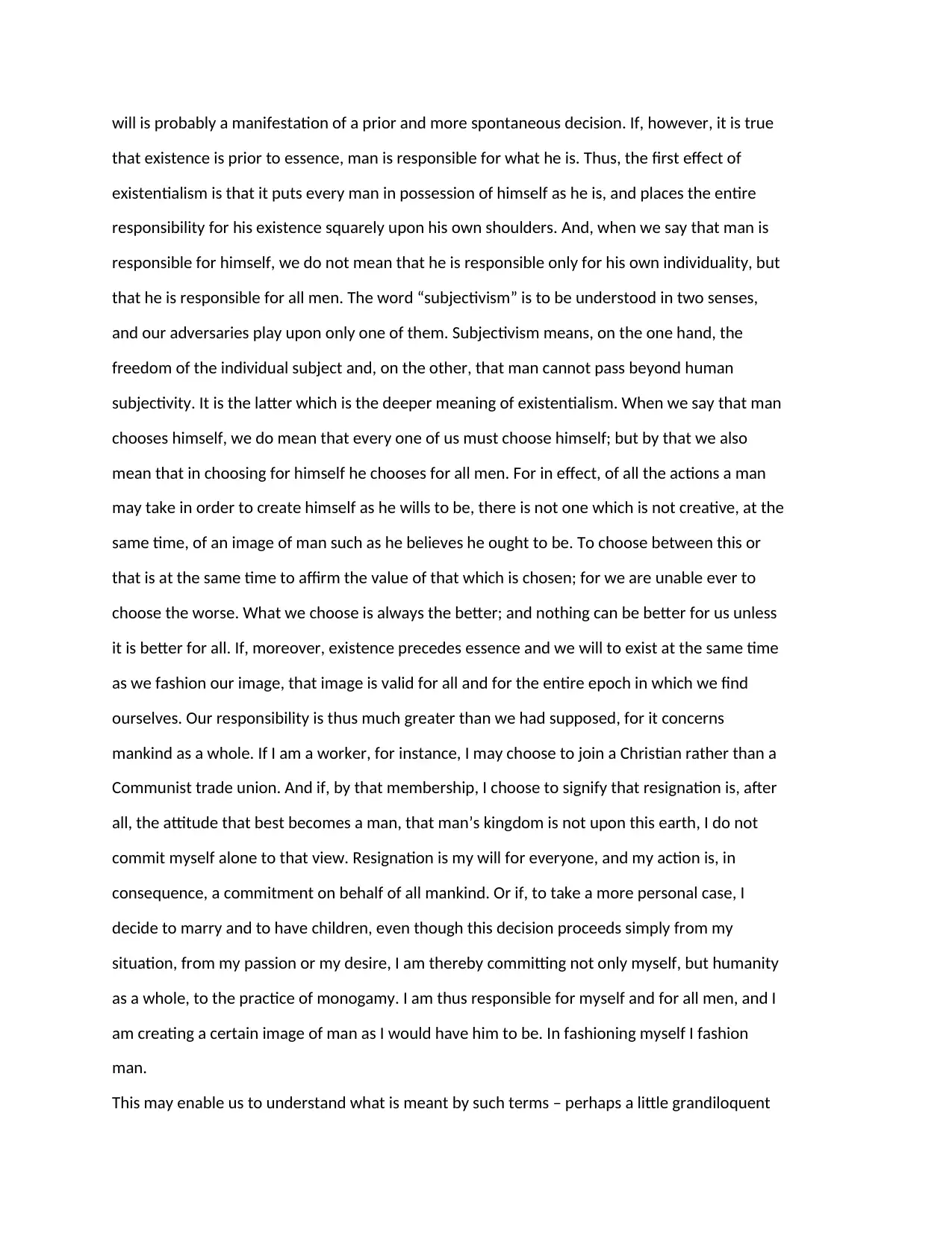
will is probably a manifestation of a prior and more spontaneous decision. If, however, it is true
that existence is prior to essence, man is responsible for what he is. Thus, the first effect of
existentialism is that it puts every man in possession of himself as he is, and places the entire
responsibility for his existence squarely upon his own shoulders. And, when we say that man is
responsible for himself, we do not mean that he is responsible only for his own individuality, but
that he is responsible for all men. The word “subjectivism” is to be understood in two senses,
and our adversaries play upon only one of them. Subjectivism means, on the one hand, the
freedom of the individual subject and, on the other, that man cannot pass beyond human
subjectivity. It is the latter which is the deeper meaning of existentialism. When we say that man
chooses himself, we do mean that every one of us must choose himself; but by that we also
mean that in choosing for himself he chooses for all men. For in effect, of all the actions a man
may take in order to create himself as he wills to be, there is not one which is not creative, at the
same time, of an image of man such as he believes he ought to be. To choose between this or
that is at the same time to affirm the value of that which is chosen; for we are unable ever to
choose the worse. What we choose is always the better; and nothing can be better for us unless
it is better for all. If, moreover, existence precedes essence and we will to exist at the same time
as we fashion our image, that image is valid for all and for the entire epoch in which we find
ourselves. Our responsibility is thus much greater than we had supposed, for it concerns
mankind as a whole. If I am a worker, for instance, I may choose to join a Christian rather than a
Communist trade union. And if, by that membership, I choose to signify that resignation is, after
all, the attitude that best becomes a man, that man’s kingdom is not upon this earth, I do not
commit myself alone to that view. Resignation is my will for everyone, and my action is, in
consequence, a commitment on behalf of all mankind. Or if, to take a more personal case, I
decide to marry and to have children, even though this decision proceeds simply from my
situation, from my passion or my desire, I am thereby committing not only myself, but humanity
as a whole, to the practice of monogamy. I am thus responsible for myself and for all men, and I
am creating a certain image of man as I would have him to be. In fashioning myself I fashion
man.
This may enable us to understand what is meant by such terms – perhaps a little grandiloquent
that existence is prior to essence, man is responsible for what he is. Thus, the first effect of
existentialism is that it puts every man in possession of himself as he is, and places the entire
responsibility for his existence squarely upon his own shoulders. And, when we say that man is
responsible for himself, we do not mean that he is responsible only for his own individuality, but
that he is responsible for all men. The word “subjectivism” is to be understood in two senses,
and our adversaries play upon only one of them. Subjectivism means, on the one hand, the
freedom of the individual subject and, on the other, that man cannot pass beyond human
subjectivity. It is the latter which is the deeper meaning of existentialism. When we say that man
chooses himself, we do mean that every one of us must choose himself; but by that we also
mean that in choosing for himself he chooses for all men. For in effect, of all the actions a man
may take in order to create himself as he wills to be, there is not one which is not creative, at the
same time, of an image of man such as he believes he ought to be. To choose between this or
that is at the same time to affirm the value of that which is chosen; for we are unable ever to
choose the worse. What we choose is always the better; and nothing can be better for us unless
it is better for all. If, moreover, existence precedes essence and we will to exist at the same time
as we fashion our image, that image is valid for all and for the entire epoch in which we find
ourselves. Our responsibility is thus much greater than we had supposed, for it concerns
mankind as a whole. If I am a worker, for instance, I may choose to join a Christian rather than a
Communist trade union. And if, by that membership, I choose to signify that resignation is, after
all, the attitude that best becomes a man, that man’s kingdom is not upon this earth, I do not
commit myself alone to that view. Resignation is my will for everyone, and my action is, in
consequence, a commitment on behalf of all mankind. Or if, to take a more personal case, I
decide to marry and to have children, even though this decision proceeds simply from my
situation, from my passion or my desire, I am thereby committing not only myself, but humanity
as a whole, to the practice of monogamy. I am thus responsible for myself and for all men, and I
am creating a certain image of man as I would have him to be. In fashioning myself I fashion
man.
This may enable us to understand what is meant by such terms – perhaps a little grandiloquent
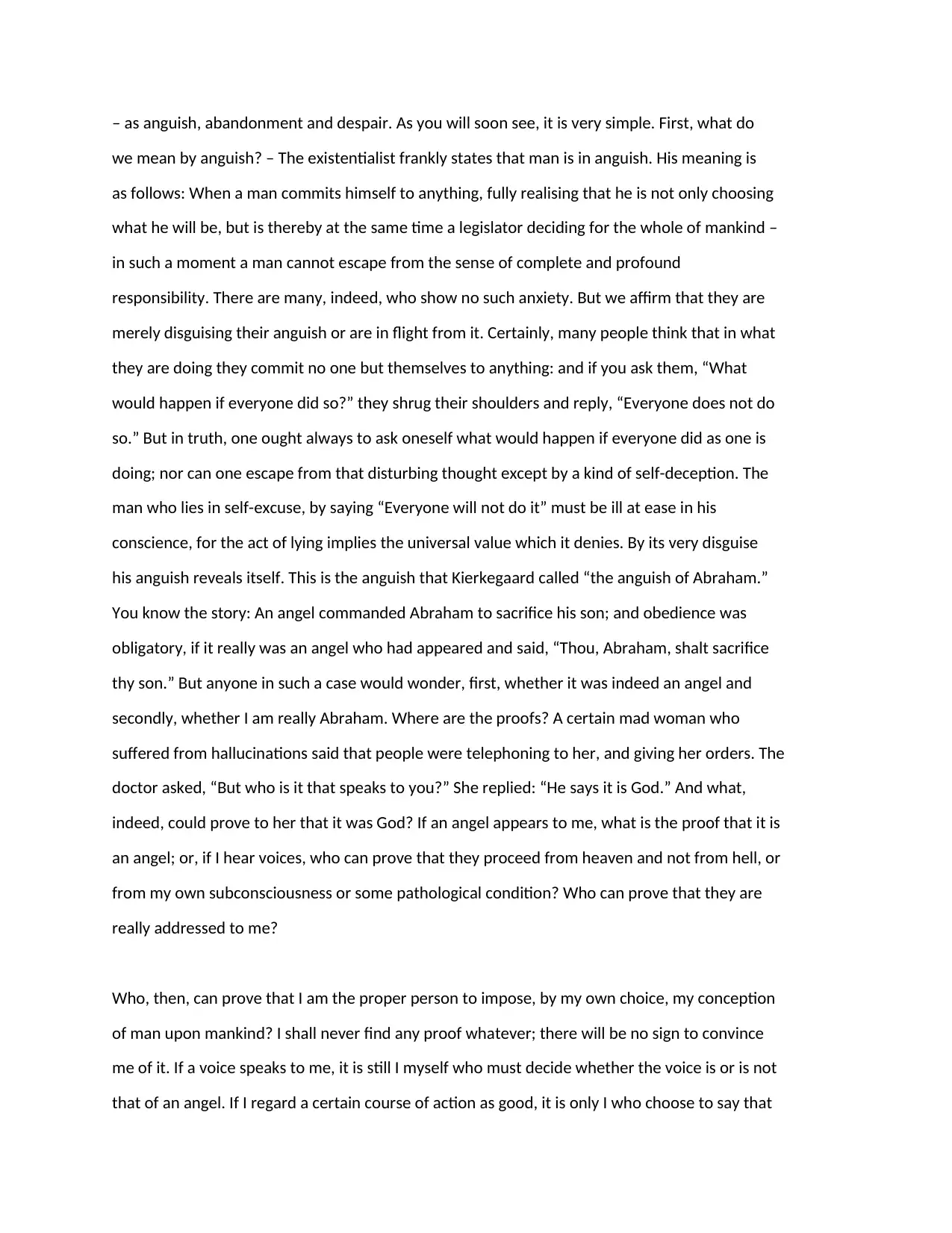
– as anguish, abandonment and despair. As you will soon see, it is very simple. First, what do
we mean by anguish? – The existentialist frankly states that man is in anguish. His meaning is
as follows: When a man commits himself to anything, fully realising that he is not only choosing
what he will be, but is thereby at the same time a legislator deciding for the whole of mankind –
in such a moment a man cannot escape from the sense of complete and profound
responsibility. There are many, indeed, who show no such anxiety. But we affirm that they are
merely disguising their anguish or are in flight from it. Certainly, many people think that in what
they are doing they commit no one but themselves to anything: and if you ask them, “What
would happen if everyone did so?” they shrug their shoulders and reply, “Everyone does not do
so.” But in truth, one ought always to ask oneself what would happen if everyone did as one is
doing; nor can one escape from that disturbing thought except by a kind of self-deception. The
man who lies in self-excuse, by saying “Everyone will not do it” must be ill at ease in his
conscience, for the act of lying implies the universal value which it denies. By its very disguise
his anguish reveals itself. This is the anguish that Kierkegaard called “the anguish of Abraham.”
You know the story: An angel commanded Abraham to sacrifice his son; and obedience was
obligatory, if it really was an angel who had appeared and said, “Thou, Abraham, shalt sacrifice
thy son.” But anyone in such a case would wonder, first, whether it was indeed an angel and
secondly, whether I am really Abraham. Where are the proofs? A certain mad woman who
suffered from hallucinations said that people were telephoning to her, and giving her orders. The
doctor asked, “But who is it that speaks to you?” She replied: “He says it is God.” And what,
indeed, could prove to her that it was God? If an angel appears to me, what is the proof that it is
an angel; or, if I hear voices, who can prove that they proceed from heaven and not from hell, or
from my own subconsciousness or some pathological condition? Who can prove that they are
really addressed to me?
Who, then, can prove that I am the proper person to impose, by my own choice, my conception
of man upon mankind? I shall never find any proof whatever; there will be no sign to convince
me of it. If a voice speaks to me, it is still I myself who must decide whether the voice is or is not
that of an angel. If I regard a certain course of action as good, it is only I who choose to say that
we mean by anguish? – The existentialist frankly states that man is in anguish. His meaning is
as follows: When a man commits himself to anything, fully realising that he is not only choosing
what he will be, but is thereby at the same time a legislator deciding for the whole of mankind –
in such a moment a man cannot escape from the sense of complete and profound
responsibility. There are many, indeed, who show no such anxiety. But we affirm that they are
merely disguising their anguish or are in flight from it. Certainly, many people think that in what
they are doing they commit no one but themselves to anything: and if you ask them, “What
would happen if everyone did so?” they shrug their shoulders and reply, “Everyone does not do
so.” But in truth, one ought always to ask oneself what would happen if everyone did as one is
doing; nor can one escape from that disturbing thought except by a kind of self-deception. The
man who lies in self-excuse, by saying “Everyone will not do it” must be ill at ease in his
conscience, for the act of lying implies the universal value which it denies. By its very disguise
his anguish reveals itself. This is the anguish that Kierkegaard called “the anguish of Abraham.”
You know the story: An angel commanded Abraham to sacrifice his son; and obedience was
obligatory, if it really was an angel who had appeared and said, “Thou, Abraham, shalt sacrifice
thy son.” But anyone in such a case would wonder, first, whether it was indeed an angel and
secondly, whether I am really Abraham. Where are the proofs? A certain mad woman who
suffered from hallucinations said that people were telephoning to her, and giving her orders. The
doctor asked, “But who is it that speaks to you?” She replied: “He says it is God.” And what,
indeed, could prove to her that it was God? If an angel appears to me, what is the proof that it is
an angel; or, if I hear voices, who can prove that they proceed from heaven and not from hell, or
from my own subconsciousness or some pathological condition? Who can prove that they are
really addressed to me?
Who, then, can prove that I am the proper person to impose, by my own choice, my conception
of man upon mankind? I shall never find any proof whatever; there will be no sign to convince
me of it. If a voice speaks to me, it is still I myself who must decide whether the voice is or is not
that of an angel. If I regard a certain course of action as good, it is only I who choose to say that
Paraphrase This Document
Need a fresh take? Get an instant paraphrase of this document with our AI Paraphraser
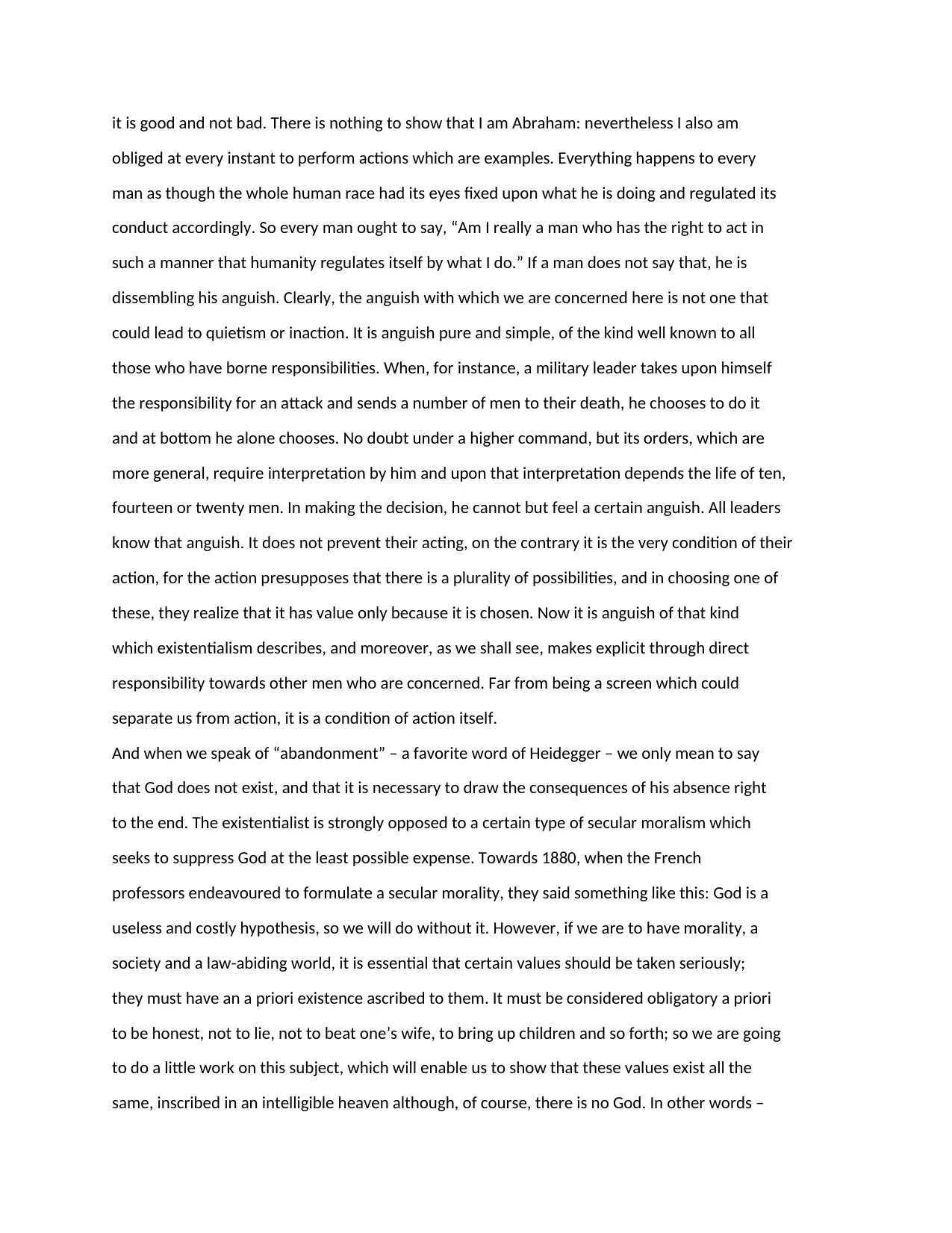
it is good and not bad. There is nothing to show that I am Abraham: nevertheless I also am
obliged at every instant to perform actions which are examples. Everything happens to every
man as though the whole human race had its eyes fixed upon what he is doing and regulated its
conduct accordingly. So every man ought to say, “Am I really a man who has the right to act in
such a manner that humanity regulates itself by what I do.” If a man does not say that, he is
dissembling his anguish. Clearly, the anguish with which we are concerned here is not one that
could lead to quietism or inaction. It is anguish pure and simple, of the kind well known to all
those who have borne responsibilities. When, for instance, a military leader takes upon himself
the responsibility for an attack and sends a number of men to their death, he chooses to do it
and at bottom he alone chooses. No doubt under a higher command, but its orders, which are
more general, require interpretation by him and upon that interpretation depends the life of ten,
fourteen or twenty men. In making the decision, he cannot but feel a certain anguish. All leaders
know that anguish. It does not prevent their acting, on the contrary it is the very condition of their
action, for the action presupposes that there is a plurality of possibilities, and in choosing one of
these, they realize that it has value only because it is chosen. Now it is anguish of that kind
which existentialism describes, and moreover, as we shall see, makes explicit through direct
responsibility towards other men who are concerned. Far from being a screen which could
separate us from action, it is a condition of action itself.
And when we speak of “abandonment” – a favorite word of Heidegger – we only mean to say
that God does not exist, and that it is necessary to draw the consequences of his absence right
to the end. The existentialist is strongly opposed to a certain type of secular moralism which
seeks to suppress God at the least possible expense. Towards 1880, when the French
professors endeavoured to formulate a secular morality, they said something like this: God is a
useless and costly hypothesis, so we will do without it. However, if we are to have morality, a
society and a law-abiding world, it is essential that certain values should be taken seriously;
they must have an a priori existence ascribed to them. It must be considered obligatory a priori
to be honest, not to lie, not to beat one’s wife, to bring up children and so forth; so we are going
to do a little work on this subject, which will enable us to show that these values exist all the
same, inscribed in an intelligible heaven although, of course, there is no God. In other words –
obliged at every instant to perform actions which are examples. Everything happens to every
man as though the whole human race had its eyes fixed upon what he is doing and regulated its
conduct accordingly. So every man ought to say, “Am I really a man who has the right to act in
such a manner that humanity regulates itself by what I do.” If a man does not say that, he is
dissembling his anguish. Clearly, the anguish with which we are concerned here is not one that
could lead to quietism or inaction. It is anguish pure and simple, of the kind well known to all
those who have borne responsibilities. When, for instance, a military leader takes upon himself
the responsibility for an attack and sends a number of men to their death, he chooses to do it
and at bottom he alone chooses. No doubt under a higher command, but its orders, which are
more general, require interpretation by him and upon that interpretation depends the life of ten,
fourteen or twenty men. In making the decision, he cannot but feel a certain anguish. All leaders
know that anguish. It does not prevent their acting, on the contrary it is the very condition of their
action, for the action presupposes that there is a plurality of possibilities, and in choosing one of
these, they realize that it has value only because it is chosen. Now it is anguish of that kind
which existentialism describes, and moreover, as we shall see, makes explicit through direct
responsibility towards other men who are concerned. Far from being a screen which could
separate us from action, it is a condition of action itself.
And when we speak of “abandonment” – a favorite word of Heidegger – we only mean to say
that God does not exist, and that it is necessary to draw the consequences of his absence right
to the end. The existentialist is strongly opposed to a certain type of secular moralism which
seeks to suppress God at the least possible expense. Towards 1880, when the French
professors endeavoured to formulate a secular morality, they said something like this: God is a
useless and costly hypothesis, so we will do without it. However, if we are to have morality, a
society and a law-abiding world, it is essential that certain values should be taken seriously;
they must have an a priori existence ascribed to them. It must be considered obligatory a priori
to be honest, not to lie, not to beat one’s wife, to bring up children and so forth; so we are going
to do a little work on this subject, which will enable us to show that these values exist all the
same, inscribed in an intelligible heaven although, of course, there is no God. In other words –
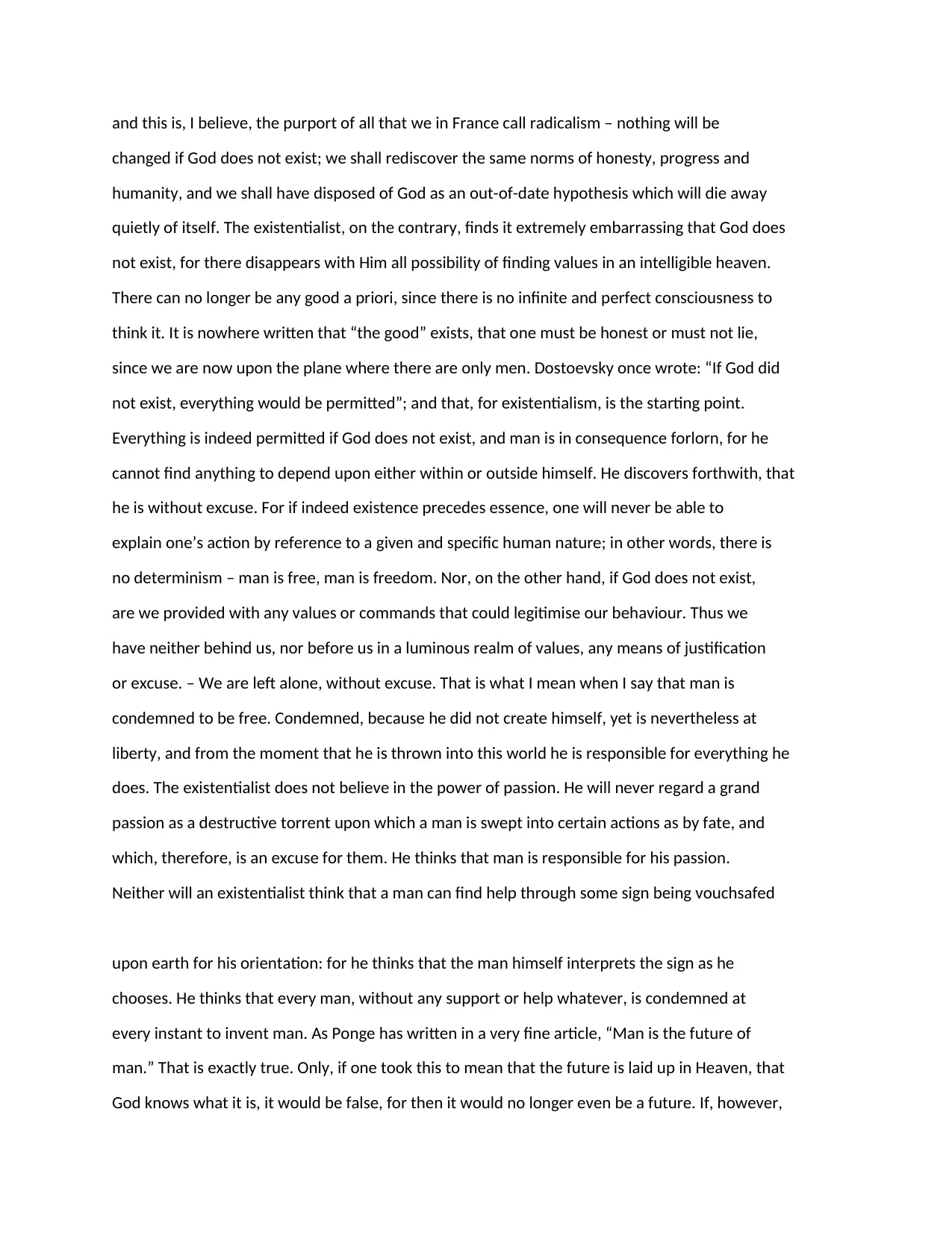
and this is, I believe, the purport of all that we in France call radicalism – nothing will be
changed if God does not exist; we shall rediscover the same norms of honesty, progress and
humanity, and we shall have disposed of God as an out-of-date hypothesis which will die away
quietly of itself. The existentialist, on the contrary, finds it extremely embarrassing that God does
not exist, for there disappears with Him all possibility of finding values in an intelligible heaven.
There can no longer be any good a priori, since there is no infinite and perfect consciousness to
think it. It is nowhere written that “the good” exists, that one must be honest or must not lie,
since we are now upon the plane where there are only men. Dostoevsky once wrote: “If God did
not exist, everything would be permitted”; and that, for existentialism, is the starting point.
Everything is indeed permitted if God does not exist, and man is in consequence forlorn, for he
cannot find anything to depend upon either within or outside himself. He discovers forthwith, that
he is without excuse. For if indeed existence precedes essence, one will never be able to
explain one’s action by reference to a given and specific human nature; in other words, there is
no determinism – man is free, man is freedom. Nor, on the other hand, if God does not exist,
are we provided with any values or commands that could legitimise our behaviour. Thus we
have neither behind us, nor before us in a luminous realm of values, any means of justification
or excuse. – We are left alone, without excuse. That is what I mean when I say that man is
condemned to be free. Condemned, because he did not create himself, yet is nevertheless at
liberty, and from the moment that he is thrown into this world he is responsible for everything he
does. The existentialist does not believe in the power of passion. He will never regard a grand
passion as a destructive torrent upon which a man is swept into certain actions as by fate, and
which, therefore, is an excuse for them. He thinks that man is responsible for his passion.
Neither will an existentialist think that a man can find help through some sign being vouchsafed
upon earth for his orientation: for he thinks that the man himself interprets the sign as he
chooses. He thinks that every man, without any support or help whatever, is condemned at
every instant to invent man. As Ponge has written in a very fine article, “Man is the future of
man.” That is exactly true. Only, if one took this to mean that the future is laid up in Heaven, that
God knows what it is, it would be false, for then it would no longer even be a future. If, however,
changed if God does not exist; we shall rediscover the same norms of honesty, progress and
humanity, and we shall have disposed of God as an out-of-date hypothesis which will die away
quietly of itself. The existentialist, on the contrary, finds it extremely embarrassing that God does
not exist, for there disappears with Him all possibility of finding values in an intelligible heaven.
There can no longer be any good a priori, since there is no infinite and perfect consciousness to
think it. It is nowhere written that “the good” exists, that one must be honest or must not lie,
since we are now upon the plane where there are only men. Dostoevsky once wrote: “If God did
not exist, everything would be permitted”; and that, for existentialism, is the starting point.
Everything is indeed permitted if God does not exist, and man is in consequence forlorn, for he
cannot find anything to depend upon either within or outside himself. He discovers forthwith, that
he is without excuse. For if indeed existence precedes essence, one will never be able to
explain one’s action by reference to a given and specific human nature; in other words, there is
no determinism – man is free, man is freedom. Nor, on the other hand, if God does not exist,
are we provided with any values or commands that could legitimise our behaviour. Thus we
have neither behind us, nor before us in a luminous realm of values, any means of justification
or excuse. – We are left alone, without excuse. That is what I mean when I say that man is
condemned to be free. Condemned, because he did not create himself, yet is nevertheless at
liberty, and from the moment that he is thrown into this world he is responsible for everything he
does. The existentialist does not believe in the power of passion. He will never regard a grand
passion as a destructive torrent upon which a man is swept into certain actions as by fate, and
which, therefore, is an excuse for them. He thinks that man is responsible for his passion.
Neither will an existentialist think that a man can find help through some sign being vouchsafed
upon earth for his orientation: for he thinks that the man himself interprets the sign as he
chooses. He thinks that every man, without any support or help whatever, is condemned at
every instant to invent man. As Ponge has written in a very fine article, “Man is the future of
man.” That is exactly true. Only, if one took this to mean that the future is laid up in Heaven, that
God knows what it is, it would be false, for then it would no longer even be a future. If, however,
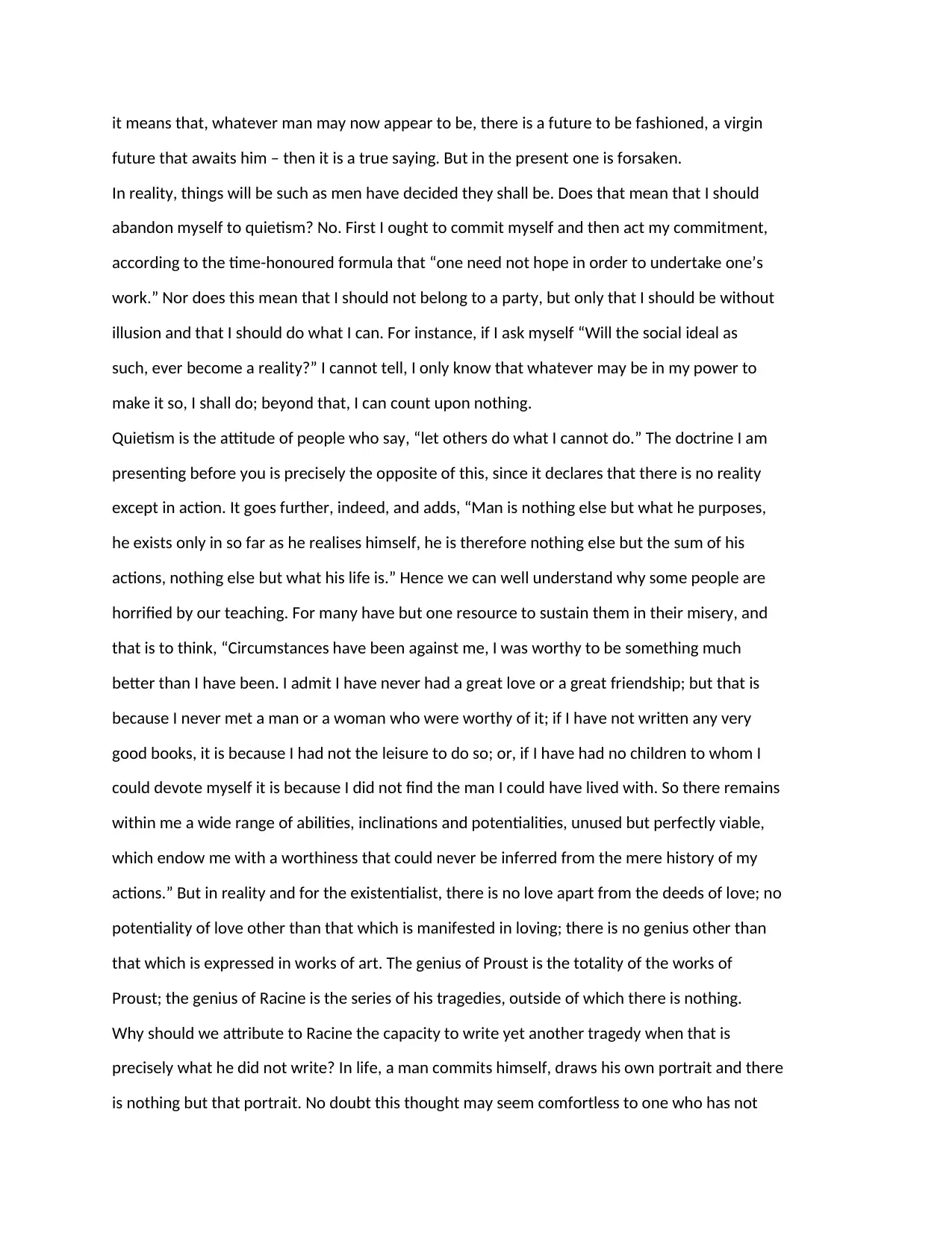
it means that, whatever man may now appear to be, there is a future to be fashioned, a virgin
future that awaits him – then it is a true saying. But in the present one is forsaken.
In reality, things will be such as men have decided they shall be. Does that mean that I should
abandon myself to quietism? No. First I ought to commit myself and then act my commitment,
according to the time-honoured formula that “one need not hope in order to undertake one’s
work.” Nor does this mean that I should not belong to a party, but only that I should be without
illusion and that I should do what I can. For instance, if I ask myself “Will the social ideal as
such, ever become a reality?” I cannot tell, I only know that whatever may be in my power to
make it so, I shall do; beyond that, I can count upon nothing.
Quietism is the attitude of people who say, “let others do what I cannot do.” The doctrine I am
presenting before you is precisely the opposite of this, since it declares that there is no reality
except in action. It goes further, indeed, and adds, “Man is nothing else but what he purposes,
he exists only in so far as he realises himself, he is therefore nothing else but the sum of his
actions, nothing else but what his life is.” Hence we can well understand why some people are
horrified by our teaching. For many have but one resource to sustain them in their misery, and
that is to think, “Circumstances have been against me, I was worthy to be something much
better than I have been. I admit I have never had a great love or a great friendship; but that is
because I never met a man or a woman who were worthy of it; if I have not written any very
good books, it is because I had not the leisure to do so; or, if I have had no children to whom I
could devote myself it is because I did not find the man I could have lived with. So there remains
within me a wide range of abilities, inclinations and potentialities, unused but perfectly viable,
which endow me with a worthiness that could never be inferred from the mere history of my
actions.” But in reality and for the existentialist, there is no love apart from the deeds of love; no
potentiality of love other than that which is manifested in loving; there is no genius other than
that which is expressed in works of art. The genius of Proust is the totality of the works of
Proust; the genius of Racine is the series of his tragedies, outside of which there is nothing.
Why should we attribute to Racine the capacity to write yet another tragedy when that is
precisely what he did not write? In life, a man commits himself, draws his own portrait and there
is nothing but that portrait. No doubt this thought may seem comfortless to one who has not
future that awaits him – then it is a true saying. But in the present one is forsaken.
In reality, things will be such as men have decided they shall be. Does that mean that I should
abandon myself to quietism? No. First I ought to commit myself and then act my commitment,
according to the time-honoured formula that “one need not hope in order to undertake one’s
work.” Nor does this mean that I should not belong to a party, but only that I should be without
illusion and that I should do what I can. For instance, if I ask myself “Will the social ideal as
such, ever become a reality?” I cannot tell, I only know that whatever may be in my power to
make it so, I shall do; beyond that, I can count upon nothing.
Quietism is the attitude of people who say, “let others do what I cannot do.” The doctrine I am
presenting before you is precisely the opposite of this, since it declares that there is no reality
except in action. It goes further, indeed, and adds, “Man is nothing else but what he purposes,
he exists only in so far as he realises himself, he is therefore nothing else but the sum of his
actions, nothing else but what his life is.” Hence we can well understand why some people are
horrified by our teaching. For many have but one resource to sustain them in their misery, and
that is to think, “Circumstances have been against me, I was worthy to be something much
better than I have been. I admit I have never had a great love or a great friendship; but that is
because I never met a man or a woman who were worthy of it; if I have not written any very
good books, it is because I had not the leisure to do so; or, if I have had no children to whom I
could devote myself it is because I did not find the man I could have lived with. So there remains
within me a wide range of abilities, inclinations and potentialities, unused but perfectly viable,
which endow me with a worthiness that could never be inferred from the mere history of my
actions.” But in reality and for the existentialist, there is no love apart from the deeds of love; no
potentiality of love other than that which is manifested in loving; there is no genius other than
that which is expressed in works of art. The genius of Proust is the totality of the works of
Proust; the genius of Racine is the series of his tragedies, outside of which there is nothing.
Why should we attribute to Racine the capacity to write yet another tragedy when that is
precisely what he did not write? In life, a man commits himself, draws his own portrait and there
is nothing but that portrait. No doubt this thought may seem comfortless to one who has not
Secure Best Marks with AI Grader
Need help grading? Try our AI Grader for instant feedback on your assignments.
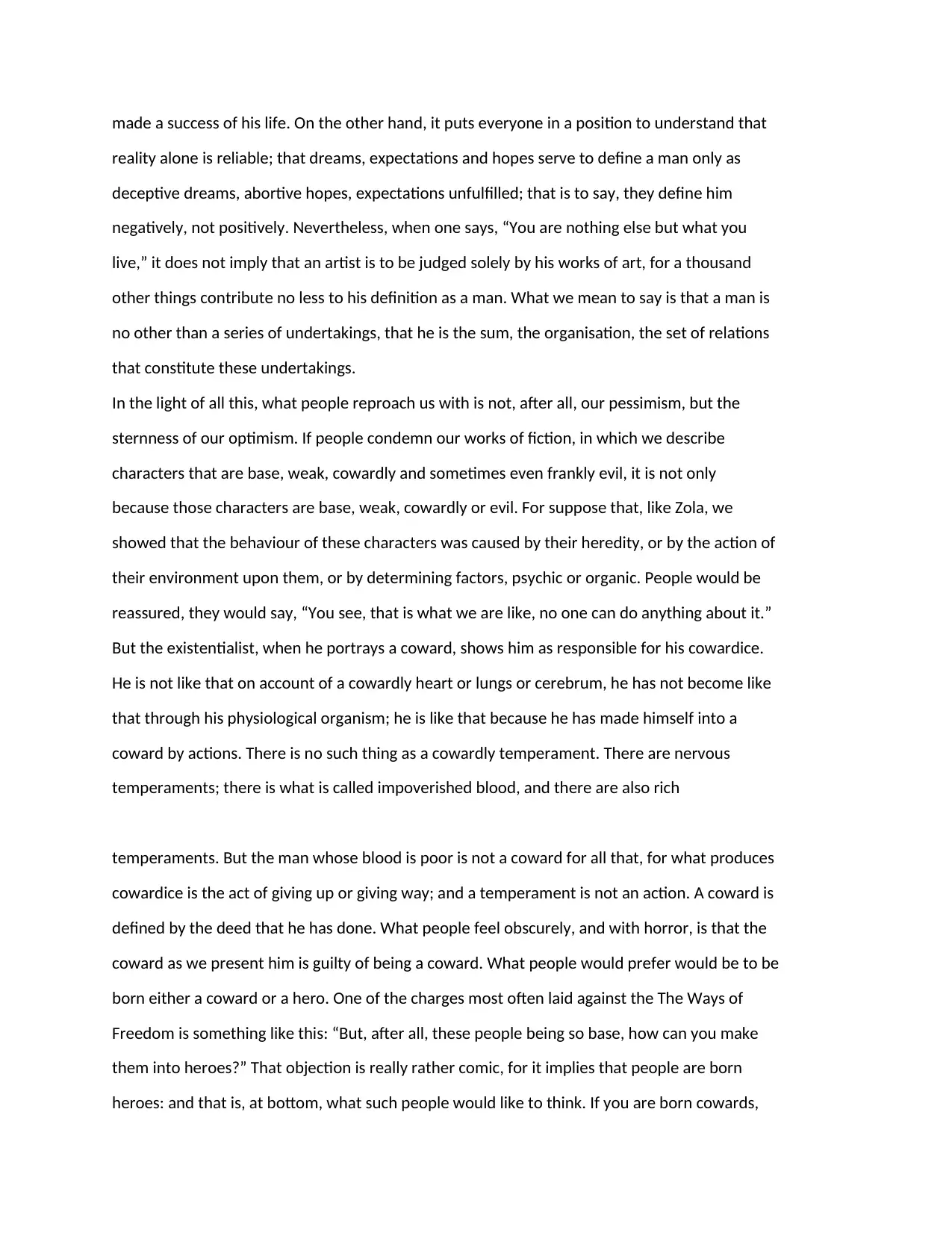
made a success of his life. On the other hand, it puts everyone in a position to understand that
reality alone is reliable; that dreams, expectations and hopes serve to define a man only as
deceptive dreams, abortive hopes, expectations unfulfilled; that is to say, they define him
negatively, not positively. Nevertheless, when one says, “You are nothing else but what you
live,” it does not imply that an artist is to be judged solely by his works of art, for a thousand
other things contribute no less to his definition as a man. What we mean to say is that a man is
no other than a series of undertakings, that he is the sum, the organisation, the set of relations
that constitute these undertakings.
In the light of all this, what people reproach us with is not, after all, our pessimism, but the
sternness of our optimism. If people condemn our works of fiction, in which we describe
characters that are base, weak, cowardly and sometimes even frankly evil, it is not only
because those characters are base, weak, cowardly or evil. For suppose that, like Zola, we
showed that the behaviour of these characters was caused by their heredity, or by the action of
their environment upon them, or by determining factors, psychic or organic. People would be
reassured, they would say, “You see, that is what we are like, no one can do anything about it.”
But the existentialist, when he portrays a coward, shows him as responsible for his cowardice.
He is not like that on account of a cowardly heart or lungs or cerebrum, he has not become like
that through his physiological organism; he is like that because he has made himself into a
coward by actions. There is no such thing as a cowardly temperament. There are nervous
temperaments; there is what is called impoverished blood, and there are also rich
temperaments. But the man whose blood is poor is not a coward for all that, for what produces
cowardice is the act of giving up or giving way; and a temperament is not an action. A coward is
defined by the deed that he has done. What people feel obscurely, and with horror, is that the
coward as we present him is guilty of being a coward. What people would prefer would be to be
born either a coward or a hero. One of the charges most often laid against the The Ways of
Freedom is something like this: “But, after all, these people being so base, how can you make
them into heroes?” That objection is really rather comic, for it implies that people are born
heroes: and that is, at bottom, what such people would like to think. If you are born cowards,
reality alone is reliable; that dreams, expectations and hopes serve to define a man only as
deceptive dreams, abortive hopes, expectations unfulfilled; that is to say, they define him
negatively, not positively. Nevertheless, when one says, “You are nothing else but what you
live,” it does not imply that an artist is to be judged solely by his works of art, for a thousand
other things contribute no less to his definition as a man. What we mean to say is that a man is
no other than a series of undertakings, that he is the sum, the organisation, the set of relations
that constitute these undertakings.
In the light of all this, what people reproach us with is not, after all, our pessimism, but the
sternness of our optimism. If people condemn our works of fiction, in which we describe
characters that are base, weak, cowardly and sometimes even frankly evil, it is not only
because those characters are base, weak, cowardly or evil. For suppose that, like Zola, we
showed that the behaviour of these characters was caused by their heredity, or by the action of
their environment upon them, or by determining factors, psychic or organic. People would be
reassured, they would say, “You see, that is what we are like, no one can do anything about it.”
But the existentialist, when he portrays a coward, shows him as responsible for his cowardice.
He is not like that on account of a cowardly heart or lungs or cerebrum, he has not become like
that through his physiological organism; he is like that because he has made himself into a
coward by actions. There is no such thing as a cowardly temperament. There are nervous
temperaments; there is what is called impoverished blood, and there are also rich
temperaments. But the man whose blood is poor is not a coward for all that, for what produces
cowardice is the act of giving up or giving way; and a temperament is not an action. A coward is
defined by the deed that he has done. What people feel obscurely, and with horror, is that the
coward as we present him is guilty of being a coward. What people would prefer would be to be
born either a coward or a hero. One of the charges most often laid against the The Ways of
Freedom is something like this: “But, after all, these people being so base, how can you make
them into heroes?” That objection is really rather comic, for it implies that people are born
heroes: and that is, at bottom, what such people would like to think. If you are born cowards,
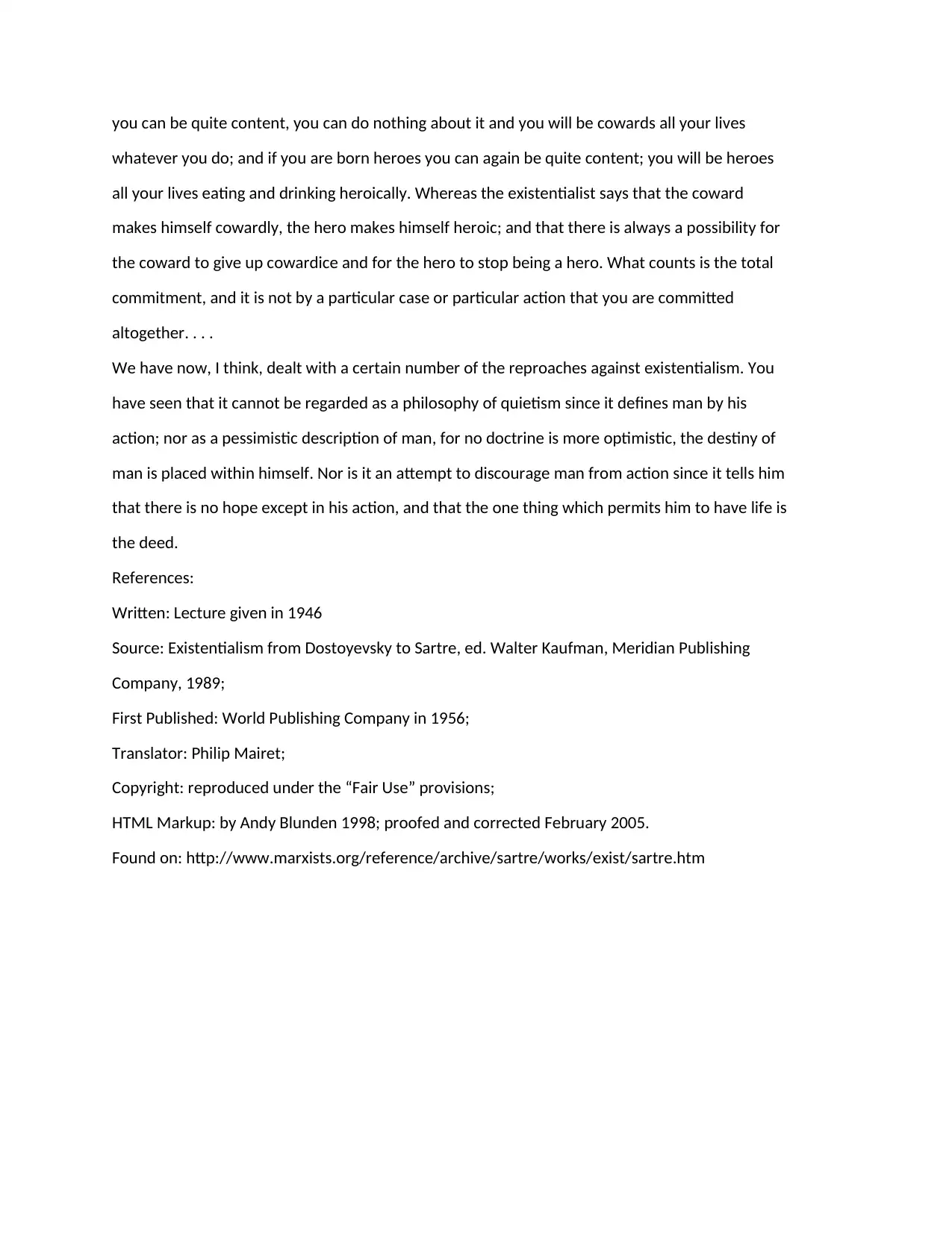
you can be quite content, you can do nothing about it and you will be cowards all your lives
whatever you do; and if you are born heroes you can again be quite content; you will be heroes
all your lives eating and drinking heroically. Whereas the existentialist says that the coward
makes himself cowardly, the hero makes himself heroic; and that there is always a possibility for
the coward to give up cowardice and for the hero to stop being a hero. What counts is the total
commitment, and it is not by a particular case or particular action that you are committed
altogether. . . .
We have now, I think, dealt with a certain number of the reproaches against existentialism. You
have seen that it cannot be regarded as a philosophy of quietism since it defines man by his
action; nor as a pessimistic description of man, for no doctrine is more optimistic, the destiny of
man is placed within himself. Nor is it an attempt to discourage man from action since it tells him
that there is no hope except in his action, and that the one thing which permits him to have life is
the deed.
References:
Written: Lecture given in 1946
Source: Existentialism from Dostoyevsky to Sartre, ed. Walter Kaufman, Meridian Publishing
Company, 1989;
First Published: World Publishing Company in 1956;
Translator: Philip Mairet;
Copyright: reproduced under the “Fair Use” provisions;
HTML Markup: by Andy Blunden 1998; proofed and corrected February 2005.
Found on: http://www.marxists.org/reference/archive/sartre/works/exist/sartre.htm
whatever you do; and if you are born heroes you can again be quite content; you will be heroes
all your lives eating and drinking heroically. Whereas the existentialist says that the coward
makes himself cowardly, the hero makes himself heroic; and that there is always a possibility for
the coward to give up cowardice and for the hero to stop being a hero. What counts is the total
commitment, and it is not by a particular case or particular action that you are committed
altogether. . . .
We have now, I think, dealt with a certain number of the reproaches against existentialism. You
have seen that it cannot be regarded as a philosophy of quietism since it defines man by his
action; nor as a pessimistic description of man, for no doctrine is more optimistic, the destiny of
man is placed within himself. Nor is it an attempt to discourage man from action since it tells him
that there is no hope except in his action, and that the one thing which permits him to have life is
the deed.
References:
Written: Lecture given in 1946
Source: Existentialism from Dostoyevsky to Sartre, ed. Walter Kaufman, Meridian Publishing
Company, 1989;
First Published: World Publishing Company in 1956;
Translator: Philip Mairet;
Copyright: reproduced under the “Fair Use” provisions;
HTML Markup: by Andy Blunden 1998; proofed and corrected February 2005.
Found on: http://www.marxists.org/reference/archive/sartre/works/exist/sartre.htm
1 out of 9
Your All-in-One AI-Powered Toolkit for Academic Success.
+13062052269
info@desklib.com
Available 24*7 on WhatsApp / Email
![[object Object]](/_next/static/media/star-bottom.7253800d.svg)
Unlock your academic potential
© 2024 | Zucol Services PVT LTD | All rights reserved.


